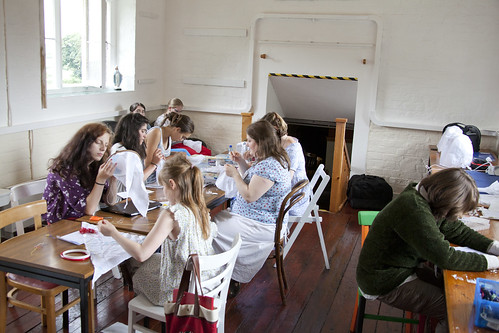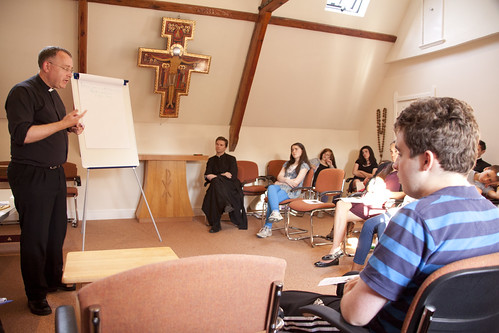 |
| Feeding the hungry, at the Summer School |
In fact giving people money is often the easy option: it is quick, it is simple, there are no ramifications to worry about, no ongoing relationship, and no superior people in the com box to say you are being patronising. The Bones has written a lot over the years about talking to the homeless, helping them with often complex practical problems, supporting them in their dealings with the authorities. This takes time, emotional energy, even a degree of experience and specialist knowledge. There is an important apostolate here, especially now that the Citizens' Advice Bureau has lost so many branches,
if the Church wanted to get involved in a systematic way. It would be a lot more complicated than handing over the price of a bus fare at the presbytery door after listening to a sob story you can't bring yourself to believe.
 |
| Passing on practical aspects of Catholic culture: the Summer School |
The idea that all problems can be solved with money, or at least with physical resources, is something which, without anyone explicitly believing it, might be called the guiding principle of the Welfare State. It is a paradox of the philosophy of action that you can be guided by a belief which you actually think is false, when you stop to think. We need to free ourselves from it. St Theresa of Calcutta said:
“You, in the West, have millions of people who suffer such terrible loneliness and emptiness. They feel unloved and unwanted. These people are not hungry in the physical sense, but they are in another way. They know they need something more than money, yet they don't know what it is.
“What they are missing, really, is a living relationship with God.”
 |
| Giving witness to the Faith: the LMS Oxford Pilgrimage |
 |
| Passing on the Faith to children: Fr Booth talking about Bl Dominic Barberi at the Summer School |
 |
| Walsingham Pilgrimage last year |
But we need to do more, we need to preserve and pass on a broader culture, an understanding of history, music, art. We need to strengthen a sense of Catholic identity, of Catholic solidarity and community, shared songs and spirituality, shared experiences, mutual understanding, sympathy, advice. This sounds like a tall order: it is a lot more than a soup-kitchen can deliver. But that is exactly what the St Catherine's Trust seeks to do with the Family Retreat and the Summer School, and it is what the Latin Mass Society is doing with our Pilgrimages and conferences.
I'm not suggesting that trads are the only people addressing these problems. Rather, I'm suggesting that the way to address them may already be under our noses. Perhaps people should stop lamenting the fact that the 'Church should be doing more', and enable the Church to do more by getting involved in the things which are already happening in the Church. As T.S. Eliot wrote:
The desert is not remote in southern tropics
The desert is not only around the corner,
The desert is squeezed in the tube-train next to you,
The desert is in the heart of your brother.
 |
| Walsingham Pilgrimage on the Holy Mile to the Holy House |
Well yes, but the existence of cultural and spiritual poverty should not mean that we do not all devote considerable sums of money to alleviating the material kind - which has not vanished; not simply write off giving people money as taking the easy way out (although I've never found parting with money particularly easy). Of course this has to be done prudently, but if it is not done people will (rightly) not take us seriously on the spiritual side.
ReplyDeleteI give my suggestion for how to address material poverty in the post. Even material problems have to be addressed in a way which goes far beyond currency.
ReplyDeleteFrankly I don't take seriously anyone who can quiet their social conscience with a handful of change.
That depends on the identity of the person giving the change; but as you yourself said, giving the homeless help beyond money requires resources and knowledge the majority of passers in the street do not possess: therefore, giving money is all that they can do. I remember the late parish priest in Tunbridge Wells had the brilliant idea of starting a soup kitchen for the down and outs that used to loiter on the parish premises. The idea was to involve the parishioners in hands on work in assisting these people. However, in the end, only one person was able to run the operation: the person with the expertise (I'm sorry to have to use that word)in dealing with the people who came through the door (some of them hardened criminals, others with mental health problems, or both). We must remind ourselves that almsgiving, even though it does little practical good these days, is enjoined on us as a duty in making reparation for the sins we have committed against our neighbour (will that's what the Roman Catechism tells us anyway).
Delete